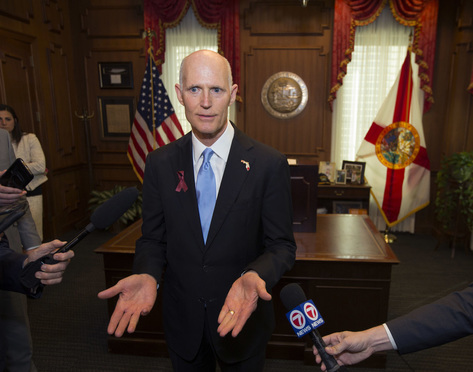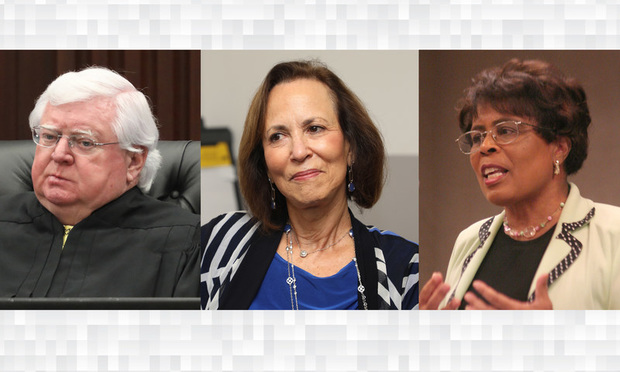Gov. Rick Scott Ramps Up Effort to Appoint 3 Justices And Reshape High Court Before Term's End
Florida Gov. Rick Scott has asked the Judicial Nominating Commission to come up with candidates to replace Florida Supreme Court Justices Fred Lewis, Barbara Pariente and Peggy Quince, who face mandatory retirement on the same day Scott leaves office.
September 12, 2018 at 03:15 PM
3 minute read
 Florida Gov. Rick Scott. Photo: Mark Wallheiser/AP
Florida Gov. Rick Scott. Photo: Mark Wallheiser/AP
The Florida Supreme Court will be three justices short on Jan. 8, 2019, the same day Gov. Rick Scott's term limit ends.
But the governor's attempts to line up replacements could pose a legal dilemma and significantly sway the court's ideological makeup.
Justices R. Fred Lewis, Barbara J. Pariente and Peggy A. Quince are on their way out due to age restrictions requiring all justices to retire by 70.
In response, Scott has requested that the Supreme Court Judicial Nominating Commission, or JNC, spend 60 days deliberating and deciding on three to six nominees per departing justice ”to minimize or avoid any period of vacancy.”
“Beginning the process to fill these vacancies right now follows the practice of previous governors,” Scott said in a statement. “Florida's Supreme Court is so important to Floridians, and we will work together to select the most qualified justices to faithfully serve our state.”
Scott had announced plans to appoint three justices on his last morning as governor, but the League of Women Voters' Florida branch and government watchdog group Common Cause objected, arguing that Florida's next governor, not Scott, should carry out the appointments.
 Related: State Appeals Court Ruling Backs Scott's Power to Appoint Judge
Related: State Appeals Court Ruling Backs Scott's Power to Appoint Judge
The groups petitioned the state Supreme Court, and Scott argued he had the power of appointment and moved for dismissal, citing lack of jurisdiction. The court dismissed the lawsuit in December 2017, stating it could not rule on something yet to happen.
“Until some action is taken by the governor, the matter the League seeks to have resolved is not ripe,” the panel wrote.
 L-R:Justices R. Fred Lewis and Barbara Pariente and Peggy Quince will bow out in January 2019. Courtesy photos
L-R:Justices R. Fred Lewis and Barbara Pariente and Peggy Quince will bow out in January 2019. Courtesy photosIf the decision does fall to Scott, the Florida Supreme Court could end up with six conservative judges.
Current Justices Lewis, Pariente and Quince are left-leaning.
Pariente was appointed to the court in 1997 by then-Gov. Lawton Chiles, a Democrat. She was chief justice from 2004 to 2006.
Lewis and Quince rose to the court in 1998 and were also appointed by Chiles.
According to Scott's office, he intends to follow the example of Chiles, who in 1998 passed the baton to Republican Jeb Bush, both of whom settled on appointing Quince to the bench.
Scott is campaigning to unseat U.S. Sen. Bill Nelson, a Democratic incumbent, in his bid for the U.S. Senate. If Scott wins, he might have to step down Jan. 3 when Congress begins its 2019 term.
In the running for Scott's gubernatorial seat are Tallahassee Mayor Andrew Gillum and former Republican Rep. Ron DeSantis, who sit on polar-opposite sides of the political spectrum.
Florida's next governor will take office Jan. 8.
Related stories:
This content has been archived. It is available through our partners, LexisNexis® and Bloomberg Law.
To view this content, please continue to their sites.
Not a Lexis Subscriber?
Subscribe Now
Not a Bloomberg Law Subscriber?
Subscribe Now
NOT FOR REPRINT
© 2025 ALM Global, LLC, All Rights Reserved. Request academic re-use from www.copyright.com. All other uses, submit a request to [email protected]. For more information visit Asset & Logo Licensing.
You Might Like
View All
US Judge Dismisses Lawsuit Brought Under NYC Gender Violence Law, Ruling Claims Barred Under State Measure

No Two Wildfires Alike: Lawyers Take Different Legal Strategies in California
5 minute read
Second DCA Greenlights USF Class Certification on COVID-19 College Tuition Refunds
3 minute read
Florida Law Firm Sued for $35 Million Over Alleged Role in Acquisition Deal Collapse
3 minute readTrending Stories
- 1Some Thoughts on What It Takes to Connect With Millennial Jurors
- 2Artificial Wisdom or Automated Folly? Practical Considerations for Arbitration Practitioners to Address the AI Conundrum
- 3The New Global M&A Kings All Have Something in Common
- 4Big Law Aims to Make DEI Less Divisive in Trump's Second Term
- 5Public Notices/Calendars
Who Got The Work
J. Brugh Lower of Gibbons has entered an appearance for industrial equipment supplier Devco Corporation in a pending trademark infringement lawsuit. The suit, accusing the defendant of selling knock-off Graco products, was filed Dec. 18 in New Jersey District Court by Rivkin Radler on behalf of Graco Inc. and Graco Minnesota. The case, assigned to U.S. District Judge Zahid N. Quraishi, is 3:24-cv-11294, Graco Inc. et al v. Devco Corporation.
Who Got The Work
Rebecca Maller-Stein and Kent A. Yalowitz of Arnold & Porter Kaye Scholer have entered their appearances for Hanaco Venture Capital and its executives, Lior Prosor and David Frankel, in a pending securities lawsuit. The action, filed on Dec. 24 in New York Southern District Court by Zell, Aron & Co. on behalf of Goldeneye Advisors, accuses the defendants of negligently and fraudulently managing the plaintiff's $1 million investment. The case, assigned to U.S. District Judge Vernon S. Broderick, is 1:24-cv-09918, Goldeneye Advisors, LLC v. Hanaco Venture Capital, Ltd. et al.
Who Got The Work
Attorneys from A&O Shearman has stepped in as defense counsel for Toronto-Dominion Bank and other defendants in a pending securities class action. The suit, filed Dec. 11 in New York Southern District Court by Bleichmar Fonti & Auld, accuses the defendants of concealing the bank's 'pervasive' deficiencies in regards to its compliance with the Bank Secrecy Act and the quality of its anti-money laundering controls. The case, assigned to U.S. District Judge Arun Subramanian, is 1:24-cv-09445, Gonzalez v. The Toronto-Dominion Bank et al.
Who Got The Work
Crown Castle International, a Pennsylvania company providing shared communications infrastructure, has turned to Luke D. Wolf of Gordon Rees Scully Mansukhani to fend off a pending breach-of-contract lawsuit. The court action, filed Nov. 25 in Michigan Eastern District Court by Hooper Hathaway PC on behalf of The Town Residences LLC, accuses Crown Castle of failing to transfer approximately $30,000 in utility payments from T-Mobile in breach of a roof-top lease and assignment agreement. The case, assigned to U.S. District Judge Susan K. Declercq, is 2:24-cv-13131, The Town Residences LLC v. T-Mobile US, Inc. et al.
Who Got The Work
Wilfred P. Coronato and Daniel M. Schwartz of McCarter & English have stepped in as defense counsel to Electrolux Home Products Inc. in a pending product liability lawsuit. The court action, filed Nov. 26 in New York Eastern District Court by Poulos Lopiccolo PC and Nagel Rice LLP on behalf of David Stern, alleges that the defendant's refrigerators’ drawers and shelving repeatedly break and fall apart within months after purchase. The case, assigned to U.S. District Judge Joan M. Azrack, is 2:24-cv-08204, Stern v. Electrolux Home Products, Inc.
Featured Firms
Law Offices of Gary Martin Hays & Associates, P.C.
(470) 294-1674
Law Offices of Mark E. Salomone
(857) 444-6468
Smith & Hassler
(713) 739-1250






